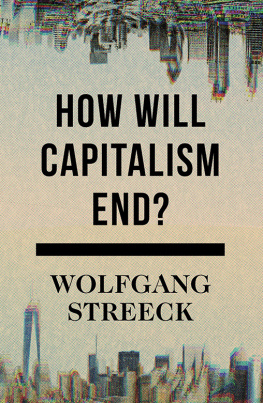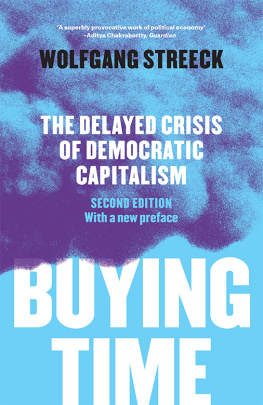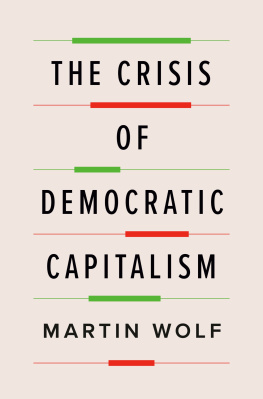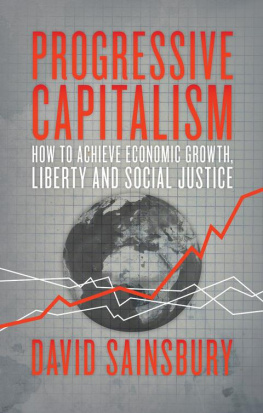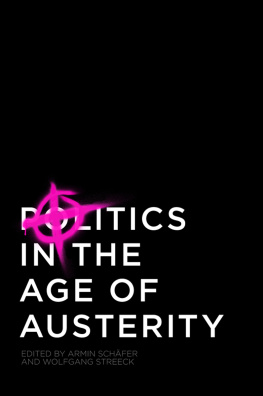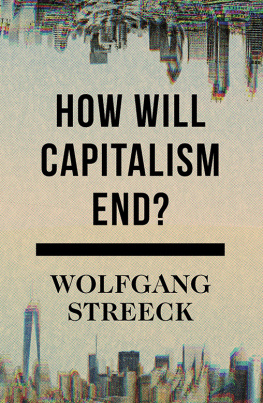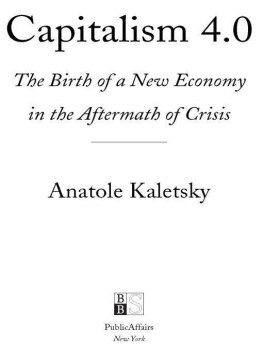How Will Capitalism End?
Essays on a Failing System
Wolfgang Streeck

First published by Verso 2016
Wolfgang Streeck 2016
Translation of Chapter 5 Tessa Hauswedell 2016
Translation of Chapter 7 Rodney Livingstone 2016
A version of Chapter 1 was delivered as the Anglo-German Foundation Lecture at the British Academy on 23 January 2014. Published in: New Left Review 87, May/June 2014, 3564. Chapter 2 was first presented as the 2011 Max Weber Lecture at the European University Institute, Florence. I am grateful to Daniel Mertens for his research assistance. Published in: New Left Review 71, September/October 2011, 529. Chapter 3 was first published in New Left Review 76, July/August 2012, 2747. Chapter 4 first published as MPIfG Discussion Paper 15/1, Cologne: Max-Planck-Institut fr Gesellschaftsforschung, 2015. Chapter 5 first published in New Left Review 73, January/February 2012, 6371. Chapter 6 first published in European Law Journal 21(3), 2015, 36170. Chapter 7 originated as the Distinguished Lecture in the Social Sciences, Wissenschaftszentrum Berlin, 21 April 2015. Published in: New Left Review 95, September/October 2015, 526. Chapter 8 first published in Zeitschrift fr Vergleichende Politikwissenschaft 9, 2015, H. 12, 4960. Chapter 9 was first presented at a plenary session on Studying Contemporary Capitalism, 10th Conference of the European Sociological Association, Social Relations in Turbulent Times, Geneva, 710 September, 2011. Published in: European Journal of Sociology 53 (1), 2012, 128. Chapter 10 first published in Julian Go (ed.), Political Power and Social Theory, Bingley: Emerald Group Publishing Limited, Vol. 23, 2012, 31121. Chapter 11 was first presented at a conference organized by the SSRC and the Wissenschaftszentrum Berlin, The Public Mission of the Social Sciences and Humanities: Transformation and Renewal, 1617 September 2011.
All rights reserved
The moral rights of the author have been asserted
1 3 5 7 9 10 8 6 4 2
Verso
UK: 6 Meard Street, London W1F 0EG
US: 20 Jay Street, Suite 1010, Brooklyn, NY 11201
versobooks.com
Verso is the imprint of New Left Books
ISBN-13: 978-1-78478-401-0 (HB)
ISBN-13: 978-1-78478-403-4 (US EBK)
ISBN-13: 978-1-78478-402-7 (UK EBK)
British Library Cataloguing in Publication Data
A catalogue record for this book is available from the British Library
Library of Congress Cataloging-in-Publication Data
Names: Streeck, Wolfgang, 1946- author.
Title: How will capitalism end? : essays on a failing system / Wolfgang Streeck.
Description: Brooklyn, New York : Verso, 2016.
Identifiers: LCCN 2016018054 | ISBN 9781784784010 (hardback) | ISBN 9781784784034 (ebook)
Subjects: LCSH: CapitalismHistory. | Economic policy. | Oligarchy. | Poverty. | Political corruption. | Anarchism. | BISAC: POLITICAL SCIENCE / Economic Conditions. | POLITICAL SCIENCE / Political Ideologies / Democracy. | POLITICAL SCIENCE / Globalization.
Classification: LCC HB501 .S919515 2016 | DDC 330.12/2dc23
LC record available at https://lccn.loc.gov/2016018054
Typeset in Minion Pro by Hewer Text UK Ltd, Edinburgh, Scotland
Printed in the US by Maple Press
Contents
Apart from the Introduction, the chapters in this collection have all been previously published: five out of eleven in New Left Review, one as a discussion paper of the research institute of which I served as director for almost two decades, and the rest in various books and journals. Pieces first appeared in print between 2011 (). Two were originally written in German and then translated, the rest I wrote in English. The help of outstandingly competent editors notwithstanding, I am painfully aware that this remains noticeable in all too many places.
The chapters included in this volume have in common that they have sprung from my continuing attempt to understand the implications of the financial crisis of 2008 for social science and sociological theory, in particular for political macrosociology and its relationship to political economy. This explains why certain themes return, resulting in occasional overlap between chapters. Eliminating that overlap would have destroyed the integrity of the chapters and would ultimately have required merging them into a systematic monograph. Not only would this have changed the purpose of the book which is to make dispersed articles on different aspects of a common theme jointly available in one place but it would also have by far exceeded both my current theoretical capacities and my available time.
The main subject of the collection is the enduring crisis of capitalism and capitalist society at the centre of the modern-capitalist global system. The thrust of the book is to inspire more concrete thinking on how that system might in a not-too-distant future come to an end, even without a successor regime in sight, as a consequence of its internal contradictions unfolding. The Introduction may be read as elaborating on and complementing what I believe is the homework that needs to be done by todays sociology to restore its ability to account for the dynamics of contemporary society and its ongoing critical transformation.
Wolfgang Streeck
Cologne, 6 April 2016
CAPITALISM: ITS DEATH AND AFTERLIFE
Capitalism has always been an improbable social formation, full of conflicts and contradictions, therefore permanently unstable and in flux, and highly conditional on historically contingent and precarious supportive as well as constraining events and institutions. Capitalist society may be described in shorthand as a progressive society in the sense of Adam Smithof industrial society, capitalist society is distinguished by the fact that its collective productive capital is accumulated in the hands of a minority of its members who enjoy the legal privilege, in the form of rights of private property, to dispose of such capital in any way they see fit, including letting it sit idle or transferring it abroad. One implication of this is that the vast majority of the members of a capitalist society must work under the direction, however mediated, of the private owners of the tools they need to provide for themselves, and on terms set by those owners in line with their desire to maximize the rate of increase of their capital. Motivating non-owners to do so to work hard and diligently in the interest of the owners requires artful devices sticks and carrots of the most diverse sorts that are never certain to function that have to be continuously reinvented as capitalist progress continuously renders them obsolescent.
The tensions and contradictions within the capitalist political-economic configuration make for an ever-present possibility of structural breakdown and social crisis. Economic and social stability under modern capitalism must be secured on a background of systemic restlessness
While none of these theories came true as imagined, most of them were not entirely false either. In fact, the history of modern capitalism can be written as a succession of crises that capitalism survived only at the price of deep transformations of its economic and social institutions, saving it from bankruptcy in unforeseeable and often unintended ways. Seen this way, that the capitalist order still exists may well appear less impressive than that it existed so often on the brink of collapse and had continuously to change, frequently depending on contingent exogenous supports that it was unable to mobilize endogenously. The fact that capitalism has, until now, managed to outlive all predictions of its impending death, need not mean that it will forever be able to do so; there is no inductive proof here, and we cannot rule out the possibility that, next time, whatever cavalry capitalism may require for its rescue may fail to show up.

